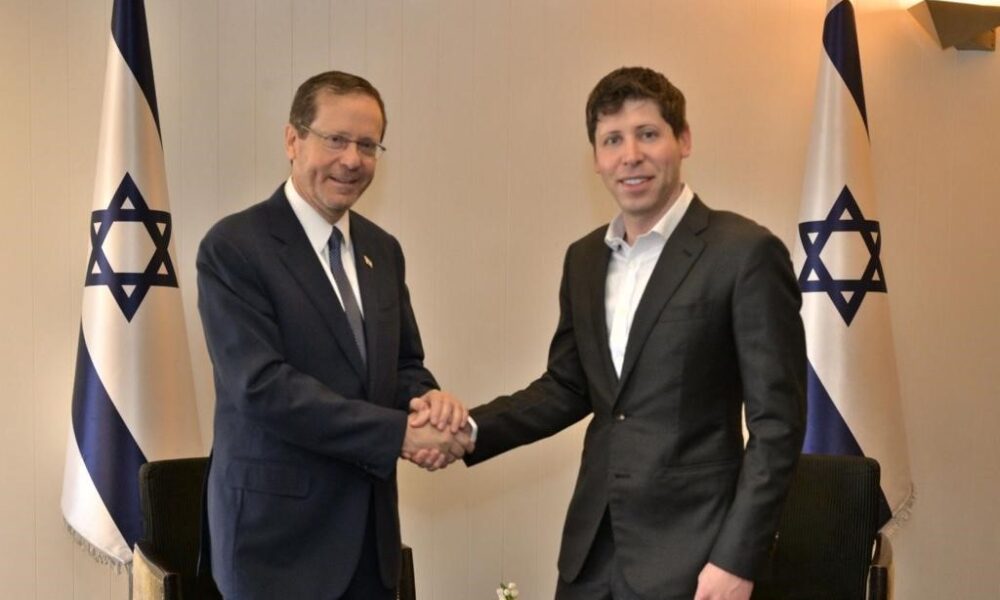Israel
ChatGPT creator praises Israel’s AI possibilities

The co-founder of OpenAI, the company that created ChatGPT, told Israeli President Isaac Herzog this week that he was “impressed” with the talent pool in Israel. He also said he believed Israel would play a “huge role” in the artificial intelligence (AI) revolution reshaping the world.
Sam Altman, the chief executive of the Microsoft-backed company, visited Israel with co-founder, Russian-Israeli Ilya Sutskever, as part of their worldwide tour to meet AI users, developers, and policymakers. Altman, who is Jewish, met Herzog, high-tech leaders, and students.
Speaking at an event held at Tel Aviv University, he reportedly said, “There are two things I have observed that are particular about Israel: the first is talent density, and the second is the relentlessness, drive, and ambition of Israeli entrepreneurs. Those two things together are optimal in leading to incredible prosperity both in terms of AI research and AI applications.” Altman and Sutskever are the innovative creators behind ChatGPT, the viral chatbot released late last year that mimics human writing and which is taking the world by storm.
ChatGPT is a tool based on a so-called large-language model trained with text data to answer questions, or prompts, as a human would.
The pair discussed the threats and challenges that AI and superintelligence will bring in the future, and emphasised the need to take the existential threats of AI seriously by creating a frontier regulatory body – similar to nuclear-power control bodies – to limit it and use it responsibly.
Herzog met the tech entrepreneur at the president’s residence in Jerusalem. He agreed with Altman that AI was “like developing nuclear weapons” and said an international convention was needed.
“We must make sure that this development is used for the well-being of humanity,” Herzog said. “You can see the advantages and disadvantages, and you are the first to mention it openly and boldly.”
The Israeli president concluded with the Jewish concept of tikkun olam (repairing the world), saying, “Let’s do tikkun olam together.”
In a world gripped with the rapid development and use of AI, legislators are contemplating regulation of the technology, and how to deal with safety issues and other potential dangers.
Local AI expert, Professor Benjamin Rosman, said, “There’s hardly any regulation in place anywhere in the world at this point, which is worrying, given what’s at stake. A few countries have started trying to do so, but it’s a particularly complicated issue that can probably work only with global buy-in.”
He said Israel hadn’t featured much in the global discussion. “The conversation has been largely led by the major United States tech companies, with strong voices in the United States and Canada playing an important role. The most notable hearings have been in the United States and the European Union at this point.”
Prime Minister Benjamin Netanyahu on 5 June announced plans for a national AI policy in both civilian and security spheres. Netanyahu said he spoke on Sunday night with Tesla’s Elon Musk about the need for governments to understand both the opportunities and the dangers of AI, and about Israel turning into a “significant global player in the field”.
“We’re at the dawn of a new era for humanity, an era of artificial intelligence,” Netanyahu said. “Things are changing at a dizzying pace, and Israel must formulate a national policy on this issue.”
Netanyahu said that during a phone conversation with Altman, the tech entrepreneur also expressed confidence that Israel could become a “main global player in the field”. During the conversation, the two discussed “opportunities and challenges facing the world and Israel in connection to AI”.
Last week, Altman met with several world leaders, including French President Emmanuel Macron, Spanish Prime Minister Pedro Sanchez, and British Prime Minister Rishi Sunak, to discuss necessary regulation in the field of AI. The meetings followed Altman’s testimony before a United States Senate Committee about its potential.